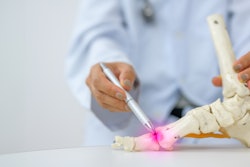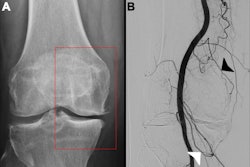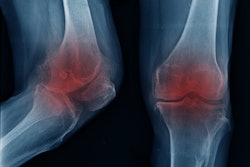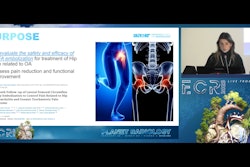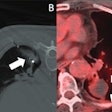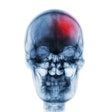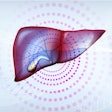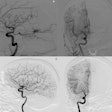Genicular artery embolization (GAE) for mild-to-moderate knee osteoarthritis can reduce pain for patients for up to two years, according to an article published May 31 in Cardiovascular and Interventional Radiology.
A follow-up study of patients who underwent the minimally invasive procedure suggested that GAE represents a valuable alternative in managing mild-to-moderate osteoarthritis patients, a group at University of Reading in the U.K. reported.
“GAE was particularly beneficial for patients who experience high pain catastrophizing at baseline,” noted lead author Mark Little, MD, and colleagues.
GAE is an emerging minimally invasive intervention for patients with painful knee osteoarthritis who are refractory to other treatments or who are reluctant to undergo or ineligible for knee replacement surgery. The procedure involves inserting microparticles to target genicular arteries that supply the synovial lining of the knee. These microparticles block blood flow, which reduces pain signals and provides relief, the authors explained.
Initial trials have shown promising results, yet to date, psychometric variables have not been considered, and a solely pathophysiological assessment is often ineffective, they explained.
To that end, the group studied outcomes in 40 patients up to two years after the procedure based on their scores on the Visual Analogue Scale (VAS) and Pain Catastrophizing Scale (PCS), two common tools for quantifying subjective pain experiences.
Out of the 40 patients, 39 reported outcomes at six weeks, with one patient missing a scheduled follow-up. Forty patients completed follow-up at three months, 37 completed completed follow-up at one year, and 28 patients at two years.
According to the analysis, at six weeks, patients who had higher levels of “pain catastrophizing” (engaging in catastrophizing thoughts about pain) based on PCS scores at baseline experienced greater reductions in pain. Also, there was a significant reduction in VAS scores from 58.63 at baseline to 37.7 at two years, the group reported.
At the two-year time point, 20 patients who had been using regular Paracetamol and 20 patients who had been using NSAIDs for managing pain had significant decreases in usage, the researchers added.
“GAE is a safe intervention for mild-moderate knee osteoarthritis, with sustained efficacy at two years. These results are promising and justify ongoing controlled trials,” the group wrote.
Ultimately, the study supports the use of GAE without the need for retreatment to maintain symptomatic control, as well as provides evidence that GAE can achieve positive results well beyond the expected duration of the placebo effect, the researchers wrote.
Limitations of the study included the relatively small sample size and lack of an experimental control group, they noted.
“Future studies should investigate optimal embolic materials, longitudinal imaging changes, biomarkers, and neuropsychological phenotypes in order to elucidate the ideal patient population for GAE,” the group concluded.
The full study is available here.




